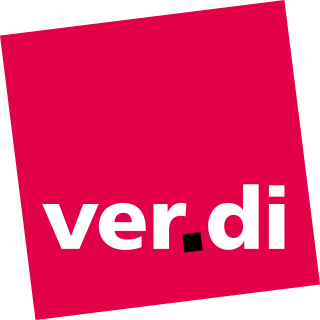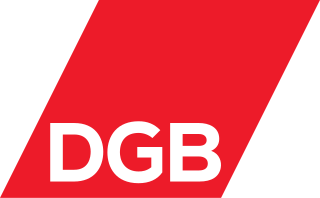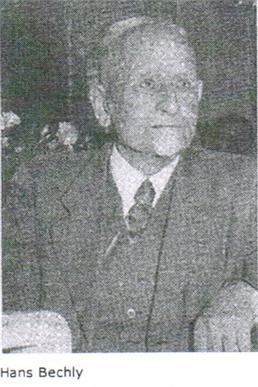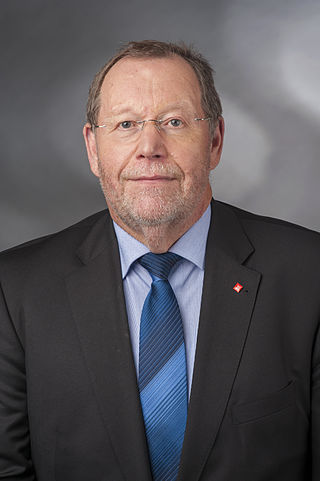
Vereinte Dienstleistungsgewerkschaft is a German trade union based in Berlin, Germany. It was established on 19 March 2001 as the result of a merger of five individual unions and is a member of the German Trade Union Confederation (DGB). With around 1.9 million members, Verdi is the second largest German trade union after IG Metall. It currently employs around 3000 members of staff in Germany and has an annual income of approximately 454 million Euros obtained from membership subscriptions. The trade union is divided into 10 federal state districts and five divisions and is managed by a National Executive Board (Bundesvorstand) with nine members. Frank Bsirske was the chairman of Verdi from its founding in 2001 until September 2019, when Frank Werneke was elected.

The German Trade Union Confederation is an umbrella organisation for eight German trade unions, in total representing more than 6 million people. It was founded in Munich, 12 October 1949.

The German Salaried Employees' Union, in German Deutsche Angestellten-Gewerkschaft (DAG) was an independent trade union based in Hamburg. It did not belong to the German Confederation of Trade Unions until it became part of ver.di, the united trade union for the services industry, in 2001.

Renate Schmidt is a German Social Democratic politician.
Trade unions in Germany have a history reaching back to the German revolution in 1848, and still play an important role in the German economy and society.

T-Mobile Workers United (TU) is an organization of T-Mobile USA and Metro by T-Mobile employees joining together for a voice and fair treatment at work. It represents currently 500 members and is affiliated with the Communications Workers of America (CWA) and Vereinte Dienstleistungsgewerkschaft (ver.di), a large German service-sector union. TU is also supported by a coalition of community and labor groups around the world.

Hans Georg Wilhelm Bechly (1871–1954) was a German labor leader and trade unionist.

Heinz-Joachim Barchmann, also known as Achim Barchmann, is a German SPD politician and trade unionist. Heinz-Joachin Barchmann has been a member of the German Bundestag since 2009.

The Public Services, Transport and Traffic Union was a trade union representing transport and public service workers in West Germany.
The Arts Union was a trade union representing cultural workers in West Germany.
The Horticulture, Agriculture and Forestry Union was a West German trade union representing agricultural and forestry workers.
Reichsvereinigung der Deutschen Gewerkschaften was a trade union centre in the First Czechoslovak Republic. The organization had its headquarters on Krakovská street 11 in Prague. Initially the Reichsvereinigung grouped all the main German nationalist, or völkisch, trade unions in the Sudetenland. As of 1921, the affiliates of the Reichsvereinigung claimed to have 49,500 members. By the end of 1928, the organization claimed to have 51,500 members. The Reichsvereinigung was a supposedly apolitical body for German workers.

The Central Union of Employees was a trade union representing white collar, private sector workers in Germany.
The Union of Trade, Food and Luxuries was a trade union representing workers in various related industries in East Germany.
The Union of Healthcare was a trade union representing healthcare workers in East Germany.

Christian Götz was a German trade unionist and politician. He was an executive board member of the Trade, Banking and Insurance Union from 1980 to 1992.
The Union of Commerce, Transport and Food was a trade union representing workers in various industries, particularly food processing, retail, hospitality and goods transport.
Trade unions have historically been unrecognized by IBM. Since the company's foundation in 1911, it has not recognized any in the United States, despite efforts by workers to establish them from 1970 onward. In Australia, Germany and Italy, several trade unions have limited recognition from IBM. IBM has been able to minimize union membership even in traditional union strongholds in Western Europe.
Günter Stephan was a German trade union leader.










